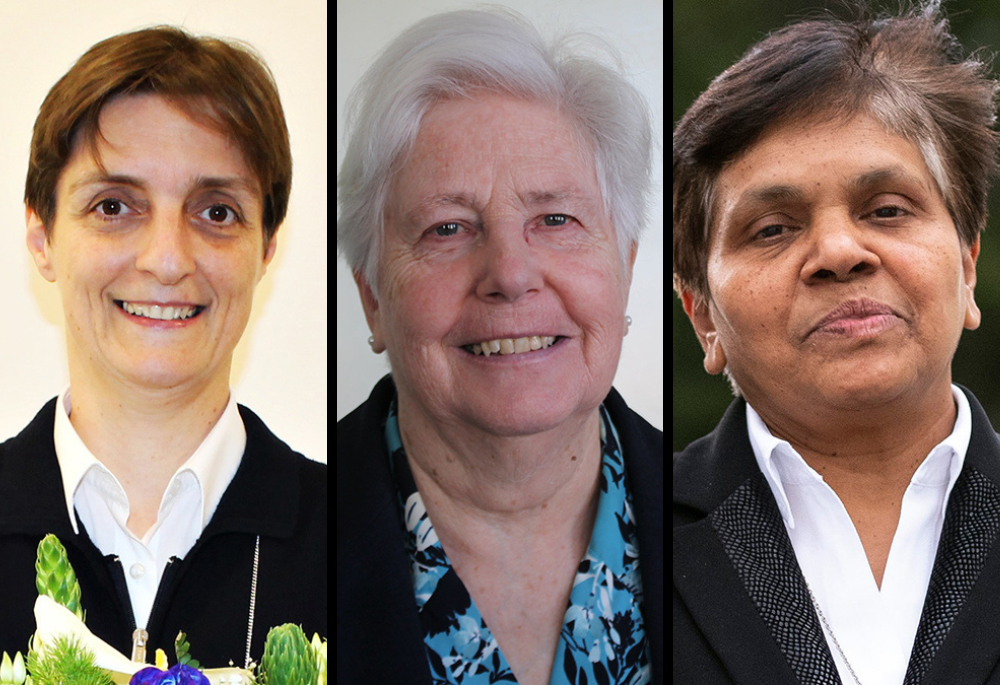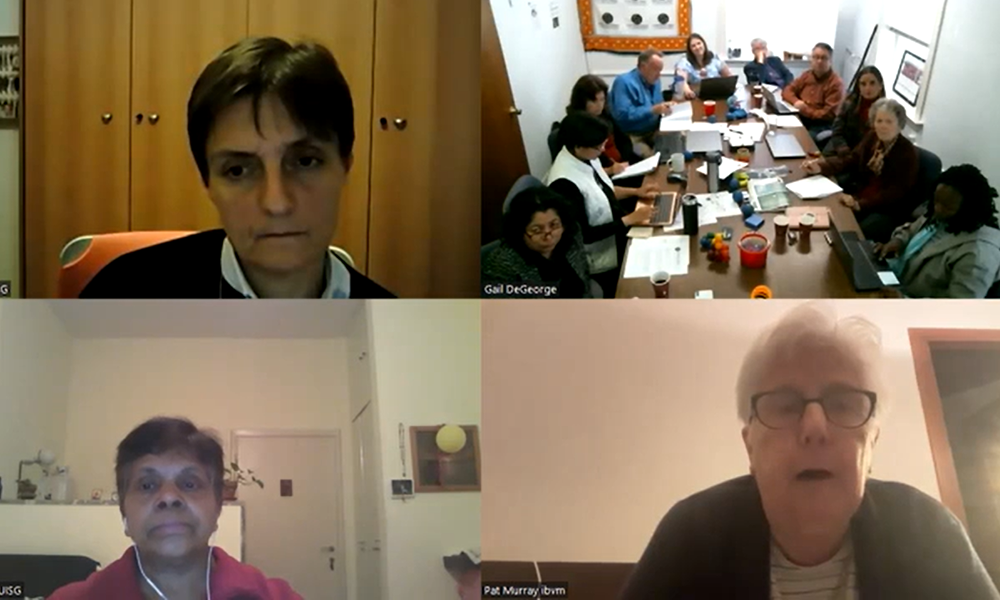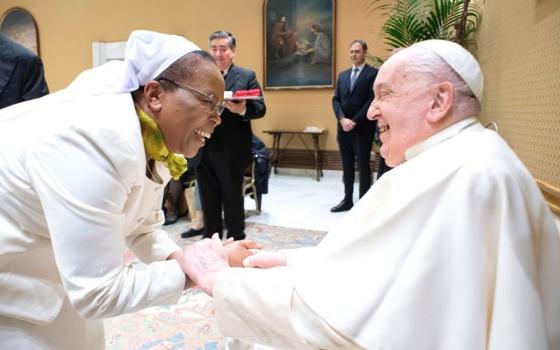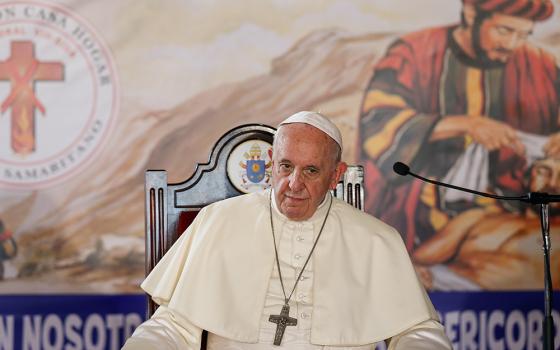
From left to right: Sr. Nadia Coppa, Adorers of the Blood of Christ, president of the International Union of Superiors General; Sr. Patricia Murray, Sisters of the Blessed Virgin Mary of Loreto, executive secretary of the UISG; and Sr. Mary John Kudiyiruppil, Missionary Servant of the Holy Spirit, UISG associate executive secretary (Photo courtesy of UISG; CNS/courtesy of UISG; CNS/courtesy of Global Solidarity Fund/Gian Marco Maraviglia).
Catholic sisters are looking both deeply outward and deeply inward — affirming both ministries to help heal a broken world and accompanying people on their spiritual journeys.
Those are among the takeaways from a nearly 90-minute interview Global Sisters Report staff had via Zoom with officers of the International Union of Superiors General, or UISG, on Wednesday, Dec. 7, at National Catholic Reporter offices in Kansas City, Missouri.
In a wide-ranging discussion on a host of topics — from various ministries to synodality to spirituality and the need for a "culture of care" — Sr. Nadia Coppa, an Adorer of the Blood of Christ and UISG's new president; Loreto Sr. Patricia Murray, UISG executive secretary; and Sr. Mary John Kudiyiruppil, a Holy Spirit Missionary sister and UISG associate executive secretary, spoke of current challenges and hopes for religious life globally.
Murray talked at length about spirituality and spiritual journeys.
"I'm so convinced that the ultimate desire of every human being is to live a full human life, to be their best selves, to live out the fullness of the giftedness that has been given to them," she told GSR staff. "And in a way, as religious women, it's in cultivating the inner self and being aware of self, being in touch with the divine, being in touch with the spiritual that's there in the world around us, and helping to accompany people."
Sisters, Murray said, have a role in accompanying people in the "search for meaning in their own life journey. So many people, and particularly so many young people, ask questions about the meaning of all sorts of things in their lives, and the meaning of life itself."
"There's a new call to us, it's kind of a prophetic call, to journey with people in the big questions of life, the big questions about survival of the planet, the big questions about the oppression of people, their suffering, the daily struggles of people to live fully and humanly."

Clockwise, from left: Sr. Nadia Coppa, UISG president; the GSR team; Sr. Patricia Murray, executive secretary; and Sr. Mary John Kudiyiruppil, associate executive secretary, participate in a Zoom video conference on Dec. 7, 2023, in Kansas City, Missouri. (Image: screenshot from GSR.)
Looking at the sisters' relations to the wider world, Coppa said religious women are working to reduce the social, political and polarization so endemic in the contemporary world, and the church. "We are living with a lot of challenges in this world, and polarization has become really common in many aspects of our society," she said. "So how can religious women, religious life, be able to build bridges, to help to grow in unity, in communion?"
Kudiyiruppil said the participation of UISG leaders at the World Economic Forum in Davos, Switzerland, in May was one way to help build bridges. Though it was a first for the sisters, Kudiyiruppil said her and others' experiences were eye-opening and beneficial both for the sisters and for CEOs of major corporations, such as Google and Microsoft.
"We were wondering what could be our contribution in this elite group," she said. "But we were surprised how they listened to us because we had something to offer, which they did not have before: our in-person presence with the vulnerable and the marginalized. In that way the Catholic sisters' presence there made a real impact."
Excerpts from the interviews follow, which have been edited and condensed.
GSR: UISG has a number of initiatives underway. What would you identify as the three top priorities and areas of emphasis in the year ahead, and are there other new initiatives underway or being planned that we should know about?
Coppa: The first initiative to underline is the synodal journey. We feel that we are protagonists in this process of listening and transformation. Synodality is a way of leading and also building a relationship. I think that is the new way to be in relationship and to search and to be in communion.
Another activity that is very important at UISG in this moment is the culture of care. We try to help the leaders to form a new way, to give life to others, to go deep in the spirituality of care — which means, first of all, to care for ourself, our interiority, our spirit, to care for the relationship with God, but also to care for the others.
Coppa expanded on these thoughts in a later email:
Spirituality of Care: "Proximity" is a good antidote to indifference, and "care" is the reverse of "abuse" in its multiple forms, as well as one of the most beautiful ways to take charge of others, of reality, of nature, and of ourselves.
There are many aspects of care:
- Care for ourselves, our interiority, our "spirit," our wounds and fractures, so that we may be free and ready to care for others.
- Care for our relationship with God. Caring for our connection with the source of life, with the One who takes care of us, rooting our trust and our hopes in Him, abandoning to Him our worries, in order to be able to "take charge" of the mission that He leaves in our hands.
- Care for the others, but also care for the social fabric. Care not only has to do with interpersonal relationships, but it is also a concept with a deep political dimension. The pandemic has exposed not only our vulnerability but also the importance of the care networks that sustain our social life. The commitment to "care" should also affect our intra-ecclesial relationships, and it implies, in any case, deconstructing the paradigm of self-sufficiency and self-defensive care contracts, seen as a political demand.
- Care for the earth.
Care of others means trying to promote the dignity and the rights of people. This is essential. This is the concept where the person is at the center — the primacy of the person that can help really to be in solidarity with the others.
In this moment what is important is to listen, to listen to the voice of the world, and to be ready to commit ourselves for help the transformation of the society, to support the people in a special way who are the most vulnerable in this moment. And the spirituality of listening, that is one of the steps of the synodality path.
I believe that it's very important because without listening, there is no synodal journey.
She expanded on these thoughts in a later email:
A Spirituality of Listening: We are simply asked to "listen" so that we can put "our spirit/our disposition" in harmony with His Spirit.
This listening is demanding. It calls for a disposition that begins with an "emptiness," by making of space, by the letting go of "my own love, desire, and interest."
Listening, says the pope, corresponds to God's humble style. This attitude of humility, it seems to me, is important if we intend to live a spirituality of listening. Listening with the heart. Without humility, there is no listening. Without listening, there is no synodal journey.
Listening is part of our mission. The first service we can render to communion is precisely "listening."
A spirituality of listening is born from this source: the perspective of a God who listens, and listens to all, and listens especially to the "voiceless," to the most vulnerable, to those who have been left without words, and does so by awakening in them the faculty to speak, because His listening is always liberating.
So in this time at UISG, we try to listen to the many voices that come, the cry of the people, the cry of the poor, the cry of the most vulnerable as an opportunity really for all of us to cultivate the attitude of solidarity and also the opportunity to walk with others in a new way.
She expanded on these thoughts in a later email:
We believe, finally, that it is really important to continue to create a network of fellowship among all participating Superior Generals that facilitates the sharing of experiences, exchange of information and training each other in their leadership roles.
We wish to encourage leaders of religious congregations to promote dialogue and collaboration, both within the church and on a broader societal level, and to support training programs for change leadership.
Advertisement
GSR: What are the major issues and challenges that you see with religious life currently? And what is UISG's role in addressing them?
Murray: I think the major challenge is to explain religious life to the contemporary world. Often our religious life is understood in terms of doing rather than in terms of our essence or our being. And part of that being is the relationship we have with God and the relationship we have with one another, which sends us out to reach out to those in need. But in a way we're called to model relationality. And that's particularly true in this multicultural, diverse world where there's an opportunity for religious life to demonstrate that we who are different in so many different ways can not only live together but thrive together, and thrive together in a way that actually is a prophetic sign.
So I think as religious women and religious life itself, it also needs to show that we are on a journey. There was a certain stability about religious life in the past in terms of both its visibility and in terms of its presence. Now we know we are experiencing our vulnerability just like everybody else, so in a sense that sharing of vulnerability is part of the gift and the journey.
One of the things that's happening within religious life is congregations are coming to completion. Their gift and their charism was there for the church and for the world for a certain length of time. And now as their members grow frailer, and also as there are smaller numbers, congregations know that in a sense their gift and their charism has served the church and the world. And in many cases they pass that to committed laypeople who share their spirituality and share their charism.
Another big challenge is many congregations are reconfiguring themselves. They're reshaping their structures, not just in terms of numbers but also in terms of how they want to be present in mission and ministry in the world today. So just like any organization, that has to be done thoughtfully, calling sisters to participate, and also to discern on the best way to be present and where to be present and how to be present in the world today.
GSR: Is there anything happening in UISG looking at the younger or newer members of congregations coming together internationally?
Murray: The other day I had an email from a group of younger sisters in the United States who asked me, could UISG put them in touch with groups of younger sisters in other parts of the world? And it's a step we will take. When an initiative comes like that, particularly from younger religious, of course you want to respond, because it's in those kind of cross-global conversations that they will have with one another, and we can help facilitate them to have cross-language conversations so that, together, they begin to reflect on today's world, today's needs and inspire one another.
And also look at their love of religious life itself — seeing the role that religious life has to play. That's one of the reasons we started a young theologians initiative. It was a gathering of about 30 younger sister theologians over a two-and-a-half-year period, helping them to reflect on religious life through their own academic disciplines. These were all young women who had Ph.D.s in theology or Scripture or ethics and the Bible, and we asked them to begin to reflect on some aspect of religious life through their own discipline because we need that kind of reflection. It's very important that we see what's emerging in religious life and reflect on it through the different theological and biblical lenses.
That is ongoing. We've had the first phase of that and we've learned from that. We will begin another phase of that in 2023, which again would be a two-year cycle, more than likely. We're building up a group of these younger women who are reflecting and sharing together and writing on religious life.
GSR: Back to the issue of care. You're doing a lot for the aging care of sisters, but what is really striking talking about overall care is that it isn't just for the elderly, but it's also for helping young women learn how to care for themselves in religious life.
Murray: When you create a culture of care that care has to extend to everyone from the leader herself to also the young and the old, and the not so young. In a sense it's a way of living that develops the self as fully as possible, but also is creating a caring society. We put together care of the earth and care of the poor. In a sense it's that culture of care to affect every aspect of our life and ministry.
Leaders of the International Union of Superiors General and the Global Solidarity Fund are pictured May 23, 2022, at the World Economic Forum in Davos, Switzerland. From left, Sr. Ruth del Pilar Mora, a Colombian who worked in Ethiopia for years; Sr. Patricia Murray, of the Sisters of Blessed Mary, Virgin of Loreto, executive secretary of the UISG; Marta Guglielmetti, executive director of the Global Solidarity Fund; and Sr. Mary John Kudiyiruppil, Servant of the Holy Spirit missionary from India and UISG associate executive secretary (Photo: CNS/courtesy of the Global Solidarity Fund/Gian Marco Maraviglia).
GSR: Tell us more about the experience in Davos.
Kudiyiruppil: It was part of a UISG sisters advocacy project. I think it is for the first time that the Catholic sisters were present there. We were asked to speak on the topic Advancing Courageous Leadership in the Post-Pandemic Global Recovery," sharing insights on how we can collaborate to ensure that our efforts serve the most vulnerable populations. And we were also asked to speak how faith-based leaders are working to advance sustainable development.
The three of us shared from our specific contexts — Sr. Pat from her many years of experience in leadership at the UISG and in South Sudan; [Salesian] Sr. Ruth del Pilar Mora, based on her experiences and grassroot encounters in Ethiopia and Eritrea; and myself from my experience in leadership administration and my experiences with congregations in India. [Marta Guglielmetti, executive director of the Global Solidarity Fund, also joined the sisters’ delegation.]
We spoke in a number of events there, and off the stage we were also given opportunities to give interviews or videos about our life and mission among the poor and the marginalized and how we could be also agents and how they can partner with the sisters in human development, in progress, etc. We added a religious and a faith dimension to Davos.
GSR: The past year has seen an increase in concern about the issue of potential nuclear war, given tensions in Ukraine. Is this a possible priority for UISG?
Murray: Today I was attending a Pax Christi conference here in Rome, which was on Pope Francis and nonviolence. And the nuclear question came up. I do feel it's something we have to educate about — peace and peace-building. That's really where I began my ministry life in the north of Ireland and studying peace. A lot see peace as the absence of violence, which is negative peace rather than seeing what positive piece looks like. I think there's work for us at UISG to do, and I think it comes underneath the whole umbrella of care because if you want care, you want shalom, fullness of life for people.
I came away from the Pax Christi conference saying, "What is ours to do at UISG?" And help the reflection on peace and peace-building, peacemaking, and looking at violence and the different kinds of violence that are experienced in life today. And how do you create this culture of care that really tackles violence at every level? It's another aspect of the culture of care we're talking about. And I think we need, and hopefully at the board level we might reflect on what is it that is ours to do. There are many organizations working obviously on nonviolence and peace and anti-nuclear issues. But what's the approach that we can bring? I think that is the work we need to do.








